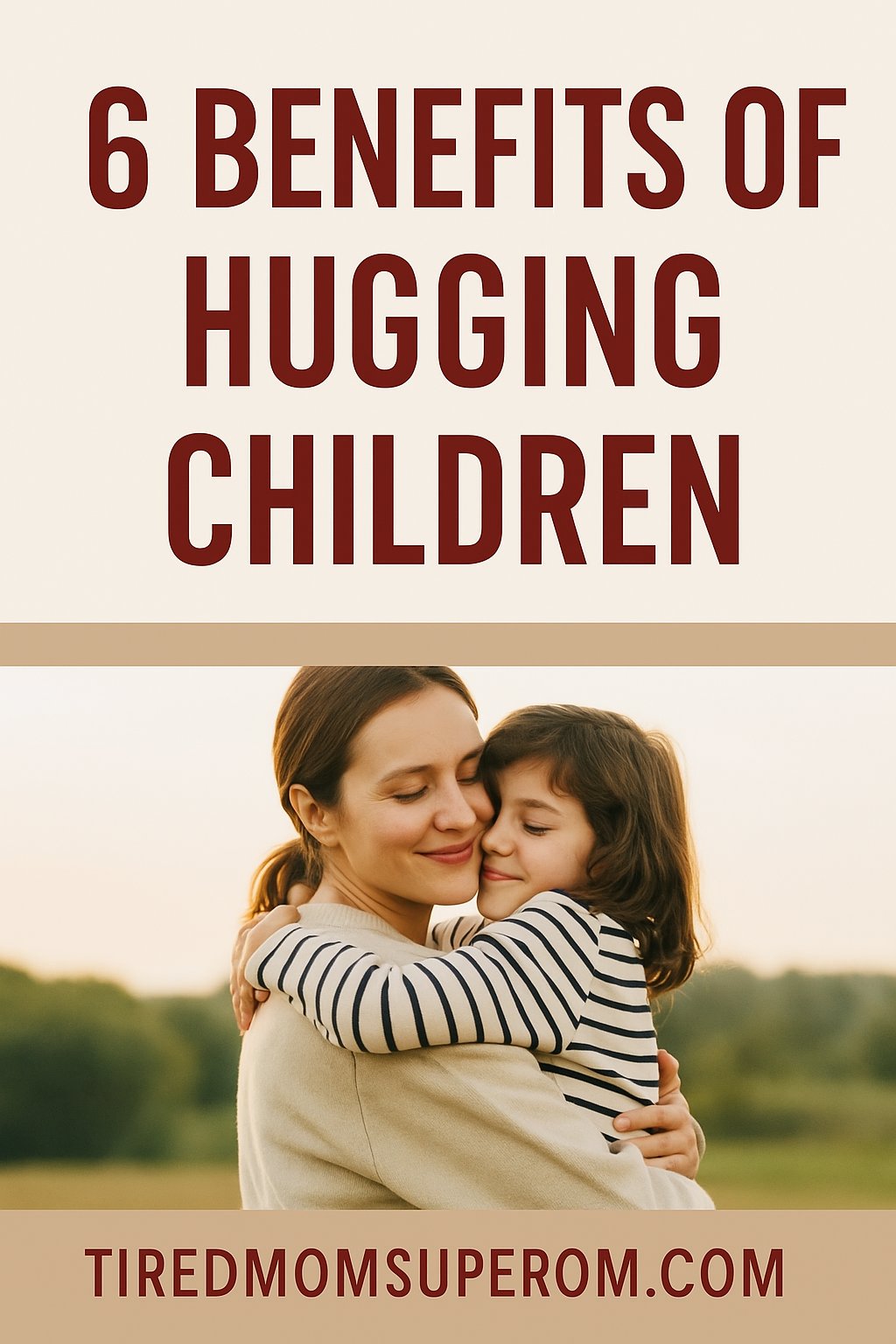6 Proven Benefits of Hugging Children: Why Daily Hugs Matter
Hugging a child is one of the most natural and comforting actions a parent can take. But beyond the feel-good moment, the benefits of hugging children are profound and scientifically backed. Daily hugs promote emotional security, cognitive development, and even physical health.
This post explores the top six benefits of hugging children, how to build hugging rituals into your day, and the tools and books that support connection through touch. If you’re looking to create a more connected, secure environment for your kids, this guide will show you exactly how.
Heads up: This post may include affiliate links. As an Amazon Associate, I earn from qualifying purchases—at no extra cost to you. Full privacy policy and disclosure here.
Benefits Of Hugs For Children
One of the most underrated parenting tools is simply recognizing the long-term benefits of hugging children during daily routines.
I remember one evening when my daughter was melting down after a long, overstimulating day—nothing I said could reach her, until I just opened my arms.
She melted into a hug, took a deep breath, and whispered, ‘I just needed this.’ That moment reminded me how powerful the benefits of hugging children really are.

1. Hugs Promote Emotional Security
When a child receives a hug, their body releases oxytocin, often referred to as the “love hormone.” This hormone plays a crucial role in reducing stress and promoting feelings of safety and connection. For young children especially, this type of physical contact signals that they are safe, loved, and protected.
Research shared by Cincinnati Family Magazine emphasizes that hugging can soothe tantrums, ease transitions, and reduce anxiety in young children. Emotional safety builds trust—and trust builds resilience.
For more on building secure bonds, see Why Understanding Attachment Theory Is Important in Parenting.
2. Hugs Reduce Stress and Anxiety in Kids
From emotional bonding to improved sleep, the benefits of hugging children go far beyond what we might expect.
The act of hugging directly lowers cortisol levels, the hormone associated with stress. A study from the Exchange Family Center shows that hugs not only reduce stress in the moment but help children learn how to regulate their emotions over time.
In stressful environments—first days of school, doctor visits, after sibling fights—a hug can act as a “reset” button for your child’s nervous system.
Tip: Consider using a visual tool like the Hug-A-Day Dry Erase Chart to encourage daily bonding habits.
3. Hugs Strengthen Parent-Child Attachment
Science continues to affirm what parents already know—the benefits of hugging children are both immediate and lifelong.
Children thrive when they feel deeply connected to their caregivers. Hugging is one of the simplest, most effective ways to reinforce that connection.
Building attachment through physical touch complements emotional support and positive discipline techniques. If you’re working on redirecting behavior or reducing tantrums, hugs can become part of your calm-down routine.
Looking for ways to reframe discipline? Explore How To Get Your Toddler To Listen Without Yelling.
4. Hugs Support Healthy Brain Development
Whether you’re calming a tantrum or celebrating a win, never underestimate the benefits of hugging children in everyday moments.
Hugging doesn’t just affect emotions—it impacts the brain. During physical affection, neural pathways associated with reward, empathy, and trust are activated.
In fact, studies show that children who receive consistent affection early in life have:
- Stronger self-regulation skills
- Higher emotional intelligence
- Better coping strategies in stressful situations
One powerful book that illustrates this science is The Power of Showing Up, which covers how consistent presence and physical connection shape a child’s brain long-term.
5. Hugs Can Improve Physical Health
Yes—hugs can even boost immunity!
Physical affection increases serotonin and endorphin levels, which promote relaxation and can even help fight off illness. One study from Carnegie Mellon found that people who were hugged more often got sick less frequently when exposed to viruses.
This benefit extends to children too, especially in environments like daycare or school where germs are everywhere.
Building healthy attachment begins early, and the benefits of hugging children start from infancy.
Bonus Tip: Keep a cozy blanket on the couch for shared snuggles. Our favorite is this ultra-soft Weighted Lap Blanket for Kids—perfect for calming down together after a long day.
6. Hugs Help With Behavioral Challenges
Many parenting experts now emphasize the benefits of hugging children as part of positive discipline strategies.
Children who receive regular, loving touch are less likely to exhibit aggression, tantrums, and clinginess.
Hugs reinforce your child’s sense of being understood and supported—without saying a word. When they’re melting down, don’t underestimate the power of saying, “Can I give you a hug?”
This is especially effective when paired with a calm parenting mindset. For tips on how to develop your own response system, check out How To Create a Parenting Mantra.
💗 Grab your free Daily Hug Tracker printable to start building meaningful connection habits today!
Tools, Books & Products That Encourage Hugs at Home
Here are a few fun and supportive ways to build hugging into your daily routine:
- Hug Machine by Scott Campbell – a heartwarming picture book that encourages little ones to become “hug machines” themselves.
- Hug Button DIY Kit – a wearable hug patch that helps with separation anxiety at school.
- Mindful Kids Activity Deck – includes emotional regulation games that incorporate physical affection.
Looking for more resources? See 25 Must-Read Parenting Blogs and 200 Inspirational Parenting Quotes.
If you’re striving to create a connected, calm household, consider focusing on the simple but powerful benefits of hugging children.

FAQs About Hugging Children
How many hugs does a child need daily?
Child therapist Virginia Satir famously said, “We need four hugs a day for survival, eight for maintenance, and twelve for growth.” While there’s no magic number, more hugs = more emotional nourishment.
Can hugging improve my child’s health?
Yes, hugging can boost the immune system, reduce stress, and promote overall well-being by releasing oxytocin and reducing cortisol levels.
Are there tools to encourage more hugs at home?
Absolutely! Consider using a hug timer to make hugging a fun daily ritual.
What’s a good bedtime routine involving hugs?
Incorporate a bedtime story followed by a warm hug. Books like The Hug Machine can make this routine enjoyable.
What if my child doesn’t like hugging?
Respect their boundaries. Consider alternatives like high-fives, back rubs, or simply sitting close. Consent is key when it comes to affection.
Can hugs replace discipline?
Not exactly—but they’re a great support tool. Hugs de-escalate tension and build connection so your child is more open to redirection or limits afterward.
Are hugs still important for older kids?
Absolutely. Tweens and teens need connection too, even if they act like they don’t. Casual hugs, shoulder squeezes, and one-arm hugs count.
Do hugs help kids with special needs?
Many children with sensory sensitivities still crave deep pressure contact. Weighted blankets or hugs with extra compression may be beneficial. Always follow your child’s cues.
Final Thoughts: Why Hugging Your Children Isn’t Just Sweet—It’s Science
Hugging is one of the easiest, most powerful tools you have as a parent. It doesn’t cost anything, it doesn’t require planning—and yet it yields lasting emotional, neurological, and physical benefits. From better sleep to fewer tantrums, the benefits of hugging children are backed by science and loved by kids.
So go ahead—make hugging part of your parenting rhythm. Whether it’s before school, after dinner, or at bedtime, those moments of connection truly matter.

